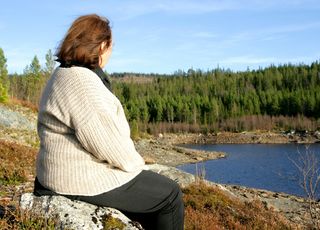Most Americans Ignore Truth About Obesity, Researchers Say

Many Americans think that people's individual decisions — not societal factors — are to blame for the obesity epidemic, but this is an oversimplified view that could hinder progress toward obesity prevention, researchers argue in a new editorial.
Although what we eat and how much we exercise certainly play roles in causing obesity, much evidence suggests that changes over the past three decades in our work schedules, schools and food and beverage availability are the driving factors of the epidemic, according to a recent report from the Institute of Medicine.
However, in a 2011 survey, just 18 percent of Americans said that environmental factors, such as the ubiquity of junk food, were the biggest causes of childhood obesity. In contrast, 64 percent said individual habits, such as overeating and watching too much TV, were to blame.And in a separate poll, the majority of Americans said the parents of obese children are the most responsible for childhood obesity.
This gap between public opinion and science-based evidence needs to be overcome in order to better combat obesity, according to the editorial.
"Even for parents and individuals that are most dedicated to trying to address weight problems, the deck is stacked against them," said Colleen Barry, an associate professor at Johns Hopkins Bloomberg School of Public Health.
Parents want their kids to eat healthful foods and exercise, but "there are forces that make it hard for parents to do it," Barry said, including marketing of unhealthy foods to children, the availability of junk foods at schools, and the lack of safe areas for children to exercise.
In order to make meaningful changes in the obesity epidemic, better communication strategies are needed to help the public understand the influence of the environment on obesity, Barry said.
Sign up for the Live Science daily newsletter now
Get the world’s most fascinating discoveries delivered straight to your inbox.
If this doesn't happen, the public may be less supportive of policies that attempt to change this obesity-conducive environment, Barry said. For instance, the recent NYC proposal to limit the sale of large-size drinks in the city was not well received by some.
To persuade people to embrace the idea that the obesity epidemic has roots in the environment, the message should come not just from public health agencies, but from trusted sources, such as churches, community groups and friends, Barry said.
However, changes in our environments, and in public views, won't happen overnight, Barry said. She pointed out that tobacco control, which ultimately resulted in smoking bans in many public places and restrictions on tobacco marketing, was a slow process.
Barry and colleagues published a paper outlining their views in the Aug. 2 issue of the New England Journal of Medicine.
Nancy Copperman, director of public health initiatives at the North Shore-Long Island Jewish Health System in Great Neck, N.Y., agreed that today's environment is a factor in people's bad health choices.
"I don't inherently think people make a choice to become obese, or to become unhealthy," Copperman said.
However, changing the environment alone won't solve the obesity epidemic, because ultimately, people need to be engaged in their health decisions, Copperman said.
People need to be educated so that they make the best choices within their environment, Copperman said. This might include education about portion sizes and what constitutes a "healthy" food, she said.
"We have to figure out an innovative way to make people more informed consumers," Copperman said.
Pass it on: Environmental factors play a large role in the obesity epidemic, a message researchers hope to get across to the public.
This story was provided by MyHealthNewsDaily, a sister site to LiveScience. Follow Rachael Rettner on Twitter @RachaelRettner,or MyHealthNewsDaily @MyHealth_MHND. We're also on Facebook & Google+.

Rachael is a Live Science contributor, and was a former channel editor and senior writer for Live Science between 2010 and 2022. She has a master's degree in journalism from New York University's Science, Health and Environmental Reporting Program. She also holds a B.S. in molecular biology and an M.S. in biology from the University of California, San Diego. Her work has appeared in Scienceline, The Washington Post and Scientific American.
